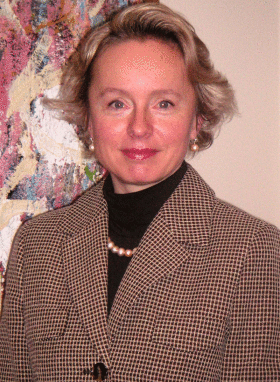People, Projects & Press – November 23, 2006

Andrea Wicke - Austrian Embassador to Lithuania
Andrea Wicke grew up in the city of Steyr, Upper Austria. Then the enthusiastic Alpine hiker returned to Vienna, her native city, to study history and German language and literature. At the same time, she took instruction in voice and piano at Vienna’s University of Music while also attending acting and operetta classes at the Conservatory. Her career as an actress and singer in operettas and musicals was highlighted by performances at some of Austria's premiere venues including the Landestheater in Salzburg and the Theater in der Josefstadt and Volkstheater in Vienna.
In 1994 following completion of postgraduate work in the University of Vienna’s International Studies program, Andrea Wicke joined the diplomatic corps. Her assignments took her to Austrian embassies in Zagreb, Prague and Sofia and to the Foreign Ministry in Vienna. “I applied specifically for this post in Lithuania, a country with a great musical tradition, and I’m so glad to be here now! I’ve been enjoying my stay in Lithuania since the moment I arrived,” said Ambassador Andrea Wicke.
It’s not everywhere that artists are taken seriously as diplomats, nor diplomats as artists for that matter, but that does not seem to apply to Lithuania, where an opera singer served as Minister of Culture in the last government. So this post would appear to present an ideal stage setting for a diplomatic artist and an artistic diplomat.
A total of 290 project proposals were submitted to the Vilnius 2009 idea competition. The entries—including nine operas—are currently being evaluated by 11 experts, who will remain anonymous in order to eliminate favoritism from the judging process. In addition to Lithuanians, ideas were submitted by entrants in Israel, Australia and the USA. The ultimate aim of this array of projects is to enable audiences to experience the entire spectrum of interplay between Baroque and Modernity in this very special urban ensemble: Vilnius as an important historical, cultural and scholarly center at the nexus of East and West with particular focus on the city’s unique Baroque cultural heritage; Vilnius as the open, tolerant and multicultural city it was in the past and continues to be; Vilnius as the first European capital of culture located in one of the post-Soviet countries that recently joined the EU; and Vilnius as a modern and dynamic city inhabited by an enormously creative people.
In cooperation with Vilnius 2009, “7 meno dienos,” an independent Lithuanian cultural journal, will be publishing a series about former capitals of culture. These weekly installments that will be running until the end of this year are based primarily on a study of European cultural centers and capitals of culture commissioned by the EC and conducted in 2004 by Palmer-Rae Associates, a cultural consulting firm. Following an account and analysis of other cities’ experiences, Lithuanian journalist and art critic Agnė Narušytė will discuss their implications for the upcoming capital of culture year in Vilnius. “7 meno dienos” has a circulation of 1,500 and has been published weekly in Vilnius since 1992.
By the way: The geographical center of Europe—54°54' north latitude, 25°19' east longitude—is located about 26 kilometers north of Vilnius near the village of Purnuškės. This is the result of measurements taken in 1989 by France’s National Institute of Geography.
Translation commissioned by Linz09





